I want to thank Mary Robinson, descendant of Captain Erwin Ambrose Bowen, for the biographical materials on her Great-Great Grandfather which is presented in this series of posts.
Captain Erwin A. Bowen was paroled from Libby Prison at Aiken’s Landing in Richmond, on September 13, 1862. At Washington, D.C. on the 17th, he secured fifteen days leave of absence and started for home on the 5 p.m. train. That leave would extend to October 2nd. On October 1st Captain Bowen mustered out of the 28th New York Volunteers. On October 31st, Lieutenant-Colonel Bowen mustered into the newly minted 151st New York Volunteers, a 3 year regiment.
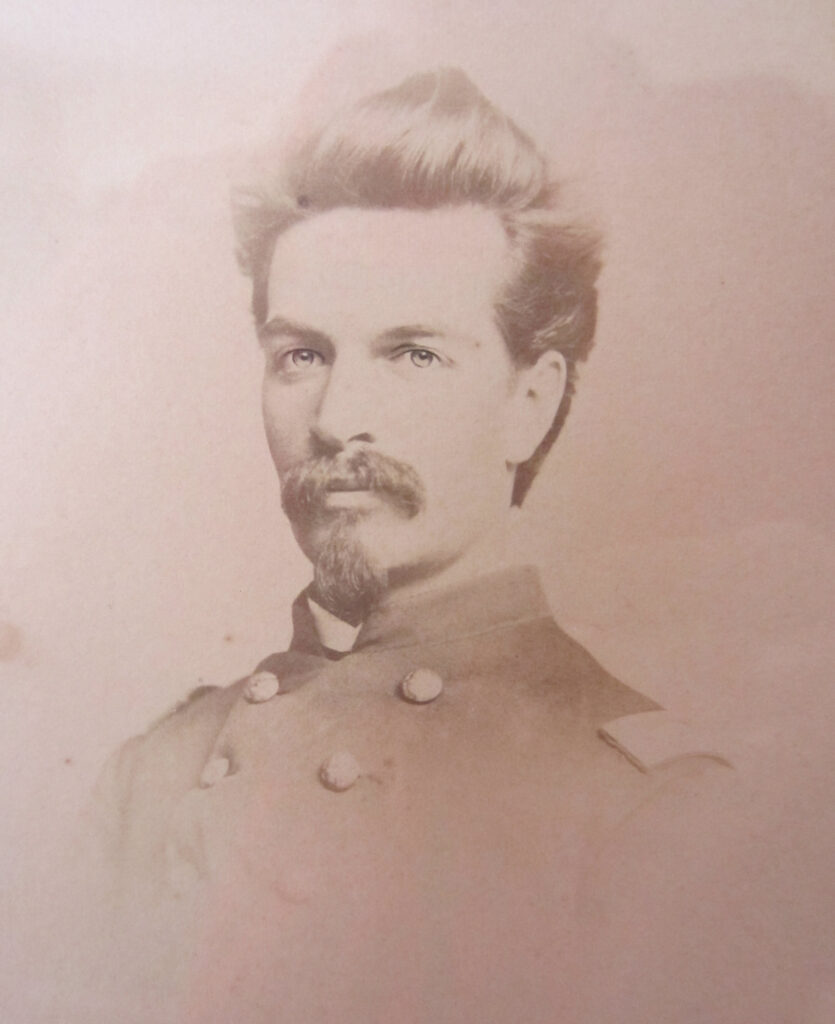
Erwin’s Uncle Hezekiah, his dad’s brother, organized Company A, of that regiment in Bowen’s hometown of Medina. Captain Hezekiah Bowen required each man purchase his own breech loading Sharps Rifle, which made Company A, a special independent company. Muzzle loading Enfield Rifles were issued to the rest of the regiment.
The 151st N.Y. saw its share of common hardships during its early months of service, but the regiment for the most part was doing garrison duty, holding strategic positions away from the front lines.
In July, 1863, it became part of the 3rd Corps, commanded by General William H. French. Some men in the corps referred to their division as “General French’s Pets” because they had not seen much action in the various campaigns despite a long service record.#1
That changed in November, 1863, during the Mine Run Campaign. Their brigade, commanded by Brigadier General William Morris, “suffered the highest regimental losses of any brigade in the Army of the Potomac during the campaign.”#2 They fought at Payne’s Farm, November 27, 1863.
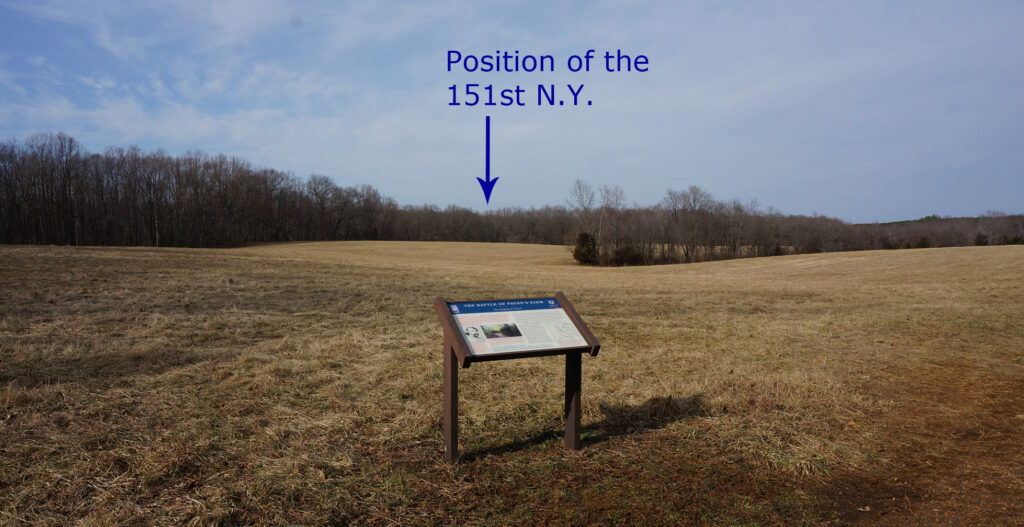
The Colonel and the Adjutant of the regiment were absent sick since August 1863, leaving Lt. Colonel Erwin A. Bowen in command. Although he was sick himself, he led the regiment into battle that day.
Some quotes from the boys in the regiment:
“…our brave boys were subjected to a murderous cross-fire which caused our line to waver and finally fall back… A new line was formed and our whole column went forward with a yell of desperate determination and the lost ground was regained.” “The bullets flew by my ears like the wind through the leaves of the trees in winter, and one shell exploded right square over my head and a great many went over me too. I did not know but one would pick me off but fortune was in my favor and I came out without a scratch. The bullets passed close to my head and struck a tree behind me and some would knock the bark off and some went on a whistling.”#3
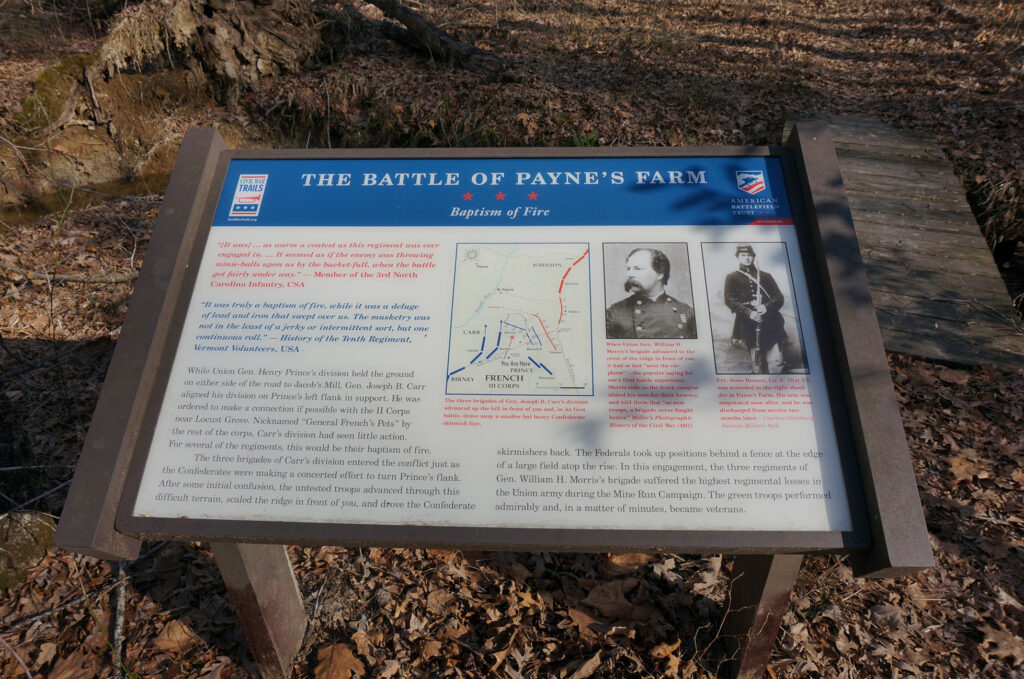
The brigade fought in the woods until nearly out of ammunition, when re-enforcements came up and took their place.
“I can never forget the experience of that night,” wrote Paul Stephen Beaudry of the 151st New York. “Dead men lying in all positions, in some places two or three close together. One soldier was laying on his back still grasping his Enfield rifle in his right hand, the left extended holding the rod as he was in the act of loading…”#4
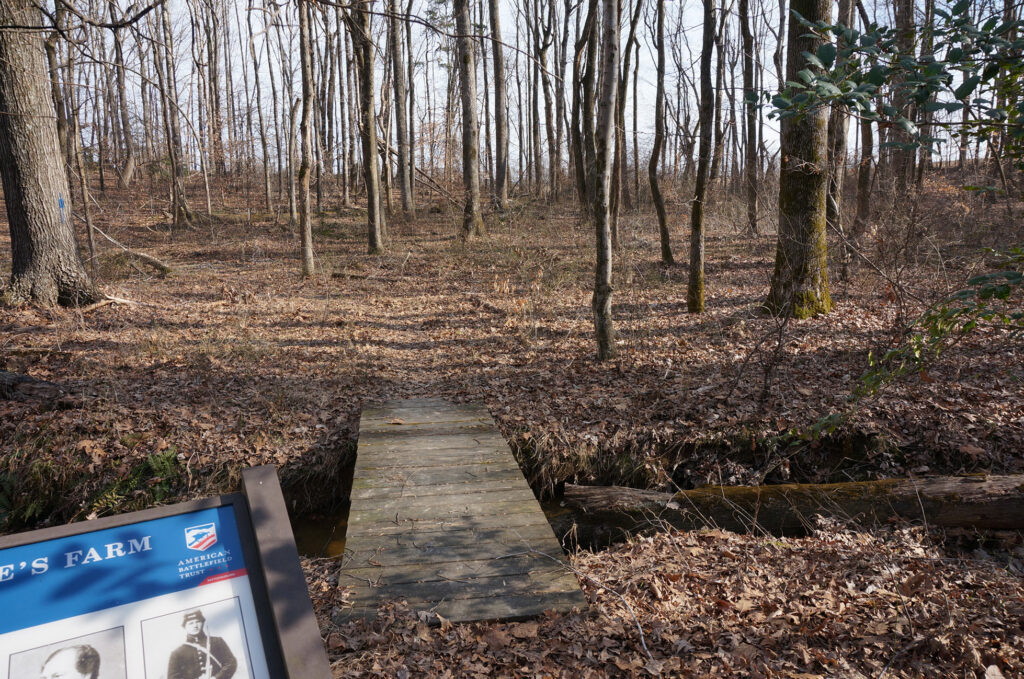
The regiment suffered 60 total casualties at the Battle of Paynes’ Farm. Captain Wilcox of Co G, was the only commissioned officer lost. Nine additional enlisted men were killed. Five others died of wounds received. Another 38 recovered, and 7 enlisted men were reported missing.#5
On December 3d, with the army safely returned to the north side of the Rapidan river, Erwin Bowen penned a letter to his wife.
Camp at Brandy Station Va
Saturday Dec 5th / 63
I had not been feeling well and on Monday (23d) I was quite unwell when we received orders about 9 P.M. to march immediately — For the first time in my life I was compelled to ride in an ambulance. It was a terrible ride from Culpeper C.H. to Brandy Station.
Dear Wife
Two weeks ago to day ( Nov 21st ) Capt Bowen arrived and commenced acting as Lieut Col and Capt Coleman as Maj.
All day Tuesday I remained in the ambulance. —Wednesday the 25th I managed to get over to Quarter Master McDonald’s Quarters — and I rested much better and had a very good appetite
Thursday morning the whole army was on the move — and against the advice of all ‐ I persisted in riding my horse — with the understanding that I should sleep in the Ambulance — We crossed the Rapidan — and it was impossible or our trains to overtake us that night. I therefore managed to pass the night — and early Friday morning we were on the march — !
I will here copy a portion of my Report, to Brigade Head Quarters.
“I would most respectfully report that about two P.M. Nov 27th in accordance with orders from Brig Gen Morris I placed my Regiment in Line of battle on the left of the 2nd Division (3d Army Corps) —
Company A (armed with Sharpes Rifles) were advanced as skirmishers and immediately became engaged with the enemy.
At this time I saw that my right was on a line with — and about twenty paces from the left of the 2nd Division
About two & a half o’clock the enemy charged with a yell driving in our skirmish line But the whole Regiment became engaged and forced the enemy back to his previous position.
Soon after the above charge —Officers in my right wing reported “Our troops on our right have gone and the enemy is flanking us”
I ordered skirmishers to the right ‐ to open up communication with the 2nd Division — but these skirmishers were soon driven in an an enfilading fire was poured upon us from the right
I attempted to change my front by breaking the right companies back, —the enemy seeing the movement charged and drove my right wing across the ravine but this wing re-formed and advancing at the double quick drove the enemy and held him
I attempted to change my front by breaking the right companies back, — the enemy seeing the movement charged and drove my right wing across the ravine but this wing re-formed and advancing at the double quick drove the enemy and held him until we were relieved in a splendid manner by the 17th Maine 3d Brigade 1st Division 3d Army Corps, Col. West Commanding.
I withdrew my Regiment eight or ten paces and remained there until the right of the17th Maine were driven back, and as — Col. West said that “his right was unprotected and the enemy was flanking him.”
Captain Bowen placed our right wing as the in line on the right of the 17th Maine
—Captain Coleman with several Companies of the left-wing filled a vacancy, between the 17th Maine & 10th Vermont Vols.
About dark the Regiment was withdrawn and bivouacked with the Brigade
Our Loss was
Capt S. S. Wilcox (one of the best Captains in the Reg’t) Killed 1
Enlisted Men Killed 7
Wounded 45
Missing 19
Total 72
I was well satisfied with the conduct of the officers and men.
The Officers all worked hard and acted nobly. — I feel under obligations to Capt H. Bowen Jr. ( Co A ) Commanding the Right Wing and to Capt F W Coleman (Co B) “ ” [Commanding] Left Wing for the services they rendered that day —
I could not have had Field Officers who would have done better.
It was not only gratifying to me alone but I had friends — brothers sisters parents Darling Wife and Child who would feel proud to know that such men had confidence — respect and affection for me. &C &C &C
It was late when I retired — and from “two until six AM” — I was unwell as usual — for the past four or five mornings ( after midnight )
At day-break I went to sleep and unintentionally delayed your (or my) letter — as DeWitt did not wish to awaken me —
Continued
Monday Evening
Dec 8 / 63
Dear Wife
Last evening I finished my letter in time for the mail — and intended to read yours that had just arrived — and mail this morning — But this morning I was asleep when De Witt went away with the mail — , — I was asleep the foregoing reason “Viz: — Last evening while I was sitting all alone in my tent reading your welcome letter ( Mailed Dec 4 )
Capt Imo, Lieut Beals and Lieut Derrick came into my tent, as I supposed quite accidentally I requested them to be seated but they said they were in a hurry as they were going to one of the officers tent to have a little Enjoyment — they urged me to go with them saying it was at the request of other officers they came to invite me. — I was conducted to Capt Imo’s tent and introduced to the assembled Regimental Officers. — and as I was shown a seat, Capt Coleman said that he had been delegated by the Officers of the Regt to present to me a testimonial of their regard — and at the close of complimentary remarks he handed me — a splendid “Field — Marine — & Opera Glass” (The best I ever saw )
I felt it impossible for me to reply to Appropriately to such an unexpected remarks as the Capt had made
I commenced with my joining the Regiment and my feeling for a long time like an intruder, a “stray sheep” &c. and how this feeling had gradually worn away, — and the affection that had since sprung up between us.
That I prized the gift more because — they had waited through days — weeks & months of the hardest campaigning
— It gave me happiness to know that the Officers who had — remained with the Regt and done the hard work, and come out nobly from our baptism of fire —had given it to me.
On February 26, 1864, Lieutenant-Colonel Bowen was discharged for disability. Since Mine Run he continued sick, laying prostrate in his tent through the winter, suffering from chllls, fever, malaria, diarrhea, cold sweats and a severe cough which pained his chest. Unable to perform his duty he reluctantly left the service.
It was probably Bowen who stated upon his resignation, “I can do more good fighting copperheads at home, than fighting rebels in the field.”#6
Back home in Medina, it took him another 2 years to get well though he never fully recovered. Bouts of sickness remained with him the rest of his life. Unable to return to farming, he found a position in town at a manufacturing plant. He and his wife Anna had 3 more children.
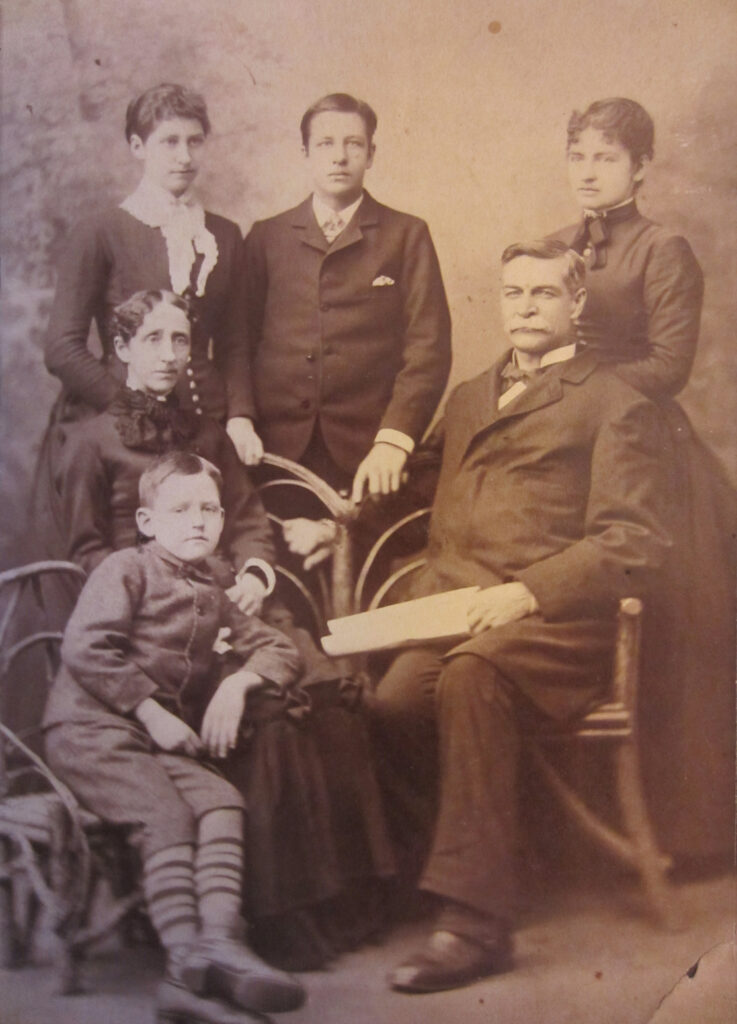
His record in the regimental roster of the 151st NY states: “After his discharge, he engaged in the iron manufacturing business in Medina. He died, Jan. 22, 1889, survived by four children, Mrs. E. F. Palmer, Mrs. E. J. Bissell, George A., of Medina, and Harry B., of Baltimore, Maryland.#7
It was Harry, the youngest family member who returned to Culpeper in August, 1902, to attend the dedication of the 28th New York Monument at the National Cemetery. Regardless of his father’s service in the 151st New York, at a higher rank, it seems to be his experiences as Captain of Company D, 28th New York Infantry, which captured the imagination of his family.
Harry recorded his visit in journal form, complete with photographs, to share with the rest of his family. It is a facsimile of this fascinating journal that will be presented here, published for the first time in our next post.
To be continued…
NOTES to Part 3:
#1. Mackowski, Mine Run, page 55. (see sources).
#2. Ibid., p. 60.
#3. Ibid., First quote, p. 63, unattributed 151st NY Soldier; Second quote, p. 68, Quote from Simon Cummins’ of same.
#4. Ibid., p. 68. Quote from Beaudry, found in Howell’s Chronicles, (see sources).
#5. Howell, Chronicles of the 151st N.Y.V.I., page 50.
#6. Ibid., page 57.
#7. Ibid., p. 124.
SOURCES:
“Chronicles of the One hundred fifty-first Regiment New York State Volunteer Infantry 1862-1865, Contributed by its Surviving Members,” compiled by Helena Adelaide Howell, 1911, A. M. Eddy, Printer, Albion, NY (Howell was Hezekiah Bowen’s daughter).
“The Great Battle Never Fought, The Mine Run Campaign, November 26 – December 2, 1862,” Chris Mackowski, 2018, Savas-Beatie, El Dorado Hills, CA.
 Print This Post
Print This Post

